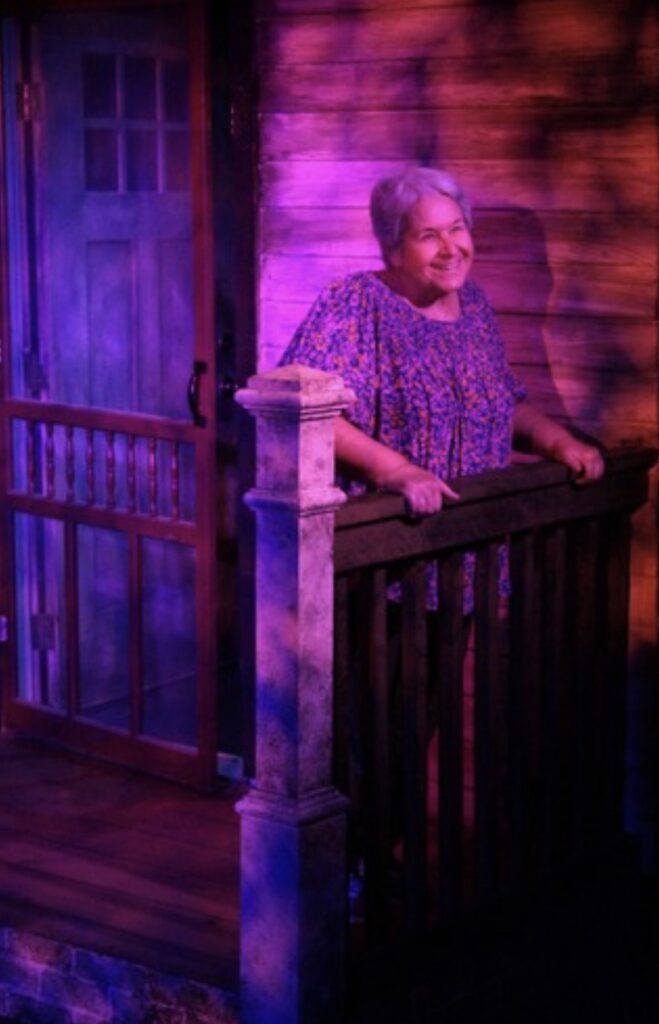
By Britin Haller
The symbolism is as thick as smoke in the air in Family Tree by Ronnie Larsen Presents and the Plays of Wilton. Now at The Foundry through May 12th, this three-person, one-setting, one-act show is a masterpiece in how it’s done, so take note.
Billed as a world premiere, Family Tree is written by Erin K. Considine, an on-stage performer for two decades who has turned to writing and is enjoying tremendous success with it at various conferences and festivals. Considine is a name to watch out for. Her presentation begins with the dulcet tones and haunting lyrics of Crosby, Stills, Nash & Young’s immortal song “Teach Your Children” to get us in the mood. Don’t you ever ask them why, if they told you, you would cry, so just look at them and sigh, and know they love you.
For anyone who’s ever lost someone inside themselves due to memory issues, Family Tree is hard to watch, but watch it we must. The story takes place over the course of an afternoon, and revolves around older brother Gavin who lives in San Francisco, his younger, but not by not much, sister Calista, and their Mama. The latter two live together in the same house the siblings grew up in in a small town about ninety minutes from the city.
Gavin doesn’t visit much for reasons that become clear, but suffice it to say Gavin and Calista don’t get along too well as neither understands the other after a lifetime of missed communication and resentments hardened their hearts to each other. But Mama needs them, and so communicate, they must.
One of the greatest compliments to give an actor is saying it felt like the action is happening for the very first time, and that could be no more true here. We are truly peering through a hole in our neighbor’s fence getting a glimpse of their lives as they play out. The audience was so immersed in this story, one could hear virtually no movement in the audience, no shuffling, no coughing, in fact, it could be said one could hear a pin drop. It was that silent.
Mama is only 66, but has early on-set Alzheimer’s and has lost the ability to verbalize her thoughts. Mostly anyway. Gavin is worried she’ll leave the oven on, and so as power of attorney, he is there to pack Mama up and take her with him to San Francisco. Calista, who is Mama’s primary caregiver, is having none of that, and Gavin accuses his baby sis of only moving back into “her childhood bedroom” because she is lazy and likes living there rent-free. Little does he know….
From the second Elizabeth Dimon as Isabella, aka Mama, comes on-stage shaking, there’s a shift in the air. “The house smells like smoke,” she says, and then proceeds to pat the porch’s wood railing in a repetitive movement we soon learn is her only way of comforting herself. But (minor spoiler), just when we start to worry there will be ninety minutes of this angst, Mama steals the show, because the playwright’s device is that Mama’s kids can’t hear her, but we can.

Elizabeth Dimon
Mama is the role of a lifetime, and one can’t imagine any other actor than Dimon who embodies the character as her own. After each particularly heated exchange between Gavin and Calista ends, heads literally turn to look at Mama to see what rapid-fire one-liner she has to say about that. With jokes like “Here’s an insight, don’t put Chapstick in the dryer,” she’s a one-woman comedy act…until she’s not, and when Mama’s mind turns introspective recalling a carnival date she had once as a young girl with a guy who could laugh without dropping his cigarette from his mouth, or why smelling smoke is so triggering to her, we are taken deep into the psyche of a once funny, interesting woman who is still there somewhere.
Harrowing. Anyone lucky enough to see Elizabeth Dimon as Mama will remember her performance for a long time. Unless, sadly, their mind won’t let them.
Bruce Linser is Gavin, the gay son and brother, whose deceased father bullied him from the time he discovered Gavin playing dress-up with his sister when he was eight. Mama didn’t seem to be too much help with that, and Calista was their father’s favorite, so where did that leave Gavin? No wonder he didn’t even return when their father was dying. Gavin struggles with “weird leftover Catholic guilt” and uses hand sanitizer after touching the Knights of Columbus flag. When he tells Calista he has moved on, we wonder if he doth protest too much. One can see the wheels spinning in Linser’s head as each reveal hits him harder and harder, and he realizes he might just be, as his sister calls him, “the poster child of self-absorption.” Watching Gavin learn to communicate, and compromise, is a true joy indeed, and when he kisses Mama’s forehead in a full-circle moment, we know everything is going to be okay. Well, not okay exactly, but definitely better.
Lindsey Corey, is Calista, the perfect little favorite who has spent her whole life trying to be the good girl. She is desperate to hold onto her mom and isn’t above bribery. “If you take your medicine, you get the honey bun,” she says to Mama, while dangling the sugary pastry like a carrot on a stick. When a particularly vulnerable Calista sits on the bench with Mama who strokes her hair, Corey is all of us. She is an actress capable of crying on cue, and the intimacy of being so up close you can see the tears on Corey’s face is a raw experience. Not to mention, she jumps rope like a boss.
Corey and Linser as brother and sister Calista and Gavin have a beautiful elegant chemistry between them. To borrow (and reword slightly) the poem/nursery rhyme by Longfellow, “When they are good, they are very very good, but when they are bad, they are horrid.” They bicker and bicker and bicker some more, disagreeing about everything especially Mama, each of them bringing to the backyard picnic table pre-conceived notions of the other that are just no longer true, if they ever were. “You couldn’t even be part of this family, not even for a day,” Calista tells her brother.
But oh, those moments when they revert to children are precious especially the “Role Call Boogie” and when something happens, and Mama’s instincts take over, they work that picnic table for lots of laughs. So much of their dialogue is touching including when Gavin finally shares with his sister the memory of the happiest day of his life involving Converse shoes, rainbow streamers, and a vineyard. Calista shares with him her own goals and dreams he never saw coming. And when an emergency arises forcing the two of them to put aside their differences and handle it, Mama gets the last laugh, because of course she does.
There are so many Carbonell Award winners affiliated with this production it would probably be easier to tell you who doesn’t have one yet. This is one stacked cast and crew. All three lead performers are members of the Actors’ Equity Association and have won one or more of the coveted statues, as has the show’s director, Margaret M. Ledford, who has done her best here to see about earning another one. Whenever Mama goes to her inner place, the lights dim accordingly thanks to Carbonell Award winner Preston’s Bircher’s design.
This is Amanda Ortega’s first time working with Ronnie Larsen Presents, and we hope it won’t be the last. She acts as both the stage manager, and does the production’s lights and sound, wowing us with an array of special effects like seagulls and ocean waves crashing. A nearby train added an unintended whistle at a perfectly appropriate place. Costumes by Casey Sacco are practical for an afternoon in middle class America.
The well-thought-out backyard set by scenic designers Jordon Armstrong and John Barry Green is prop-heavy for a reason. During the course of ninety minutes, almost every item is utilized. And the small touches are lovely, like the rosaries and novena card on display along with Mama’s Virgin Mary statue and holy water font made out of a bird bath. At one point or another, virtually every spot is filled with movement. So real it feels, one might wonder what it looks like inside Mama’s house beyond that screen door. Lovely, to be sure. And with lots of Jesuses.
Scripts don’t get much better than this with rampant symbolism mostly regarding that burned-out tree in the backyard whose roots are buckling under their home’s kitchen floor and is tied to key memories of the family’s past. “No more rope swings, no more circus, no more Tarzan, no more Jane,” Calista says forlornly. It’s almost as if that tree kept Mama’s mind present, as in Jeff Probst’s classic words from Survivor, “Fire represents your life in this game, when your fire’s gone, so are you,” and now that the tree is no more, Mama is dying off too. “I’m losing stories like they’re turning to ash,” she tells us. This is a woman who never stood up for herself, or her children really, preferring to live quietly in a home with a bully because it was just easier, and anyway where would she go? How ironic her literal voice is silent now, as it really was all along, and how sad is it when Mama finally admits she is so proud of Gavin, because we hear her, but he can’t.
Mama has a most treasured item, her Virgin Mary figurine known also as Stella Maris which is Latin for “Star of the Sea.” Stella Maris is the patron saint for sailors and is often called upon to avoid tempestuous waters, so it’s no coincidence Mama loves the ocean. When her beloved Stella Maris is accidently broken, then put back together only to break again, we can see the writing is on the wall for Mama.
In the end, Calista reminds us “Families are supposed to stay together.” So grab your sister, your mama, your partner, or your friend, and skip rope to The Foundry before Family Tree leaves (get it?) town for good.
Britin Haller is the Senior Editor for Charade Media. Her latest novel is Dumpster Dying by Michelle Bennington, available where books are sold. Find Britin across social media and at Charadebooks.com.
Family Tree plays through Sunday, May 12 at The Foundry, 2306 Dixie Highway, Wilton Manors; Evening shows are at 8 p.m. on Thursday, Friday and Saturday; Matinees at 3 p.m. on Sundays. Running time approx. 90 minutes with no intermission. Tickets start at $37.50. Call 954-826-8790, or visit playsofwilton.com.










 A PaperStreet Web Design
A PaperStreet Web Design
